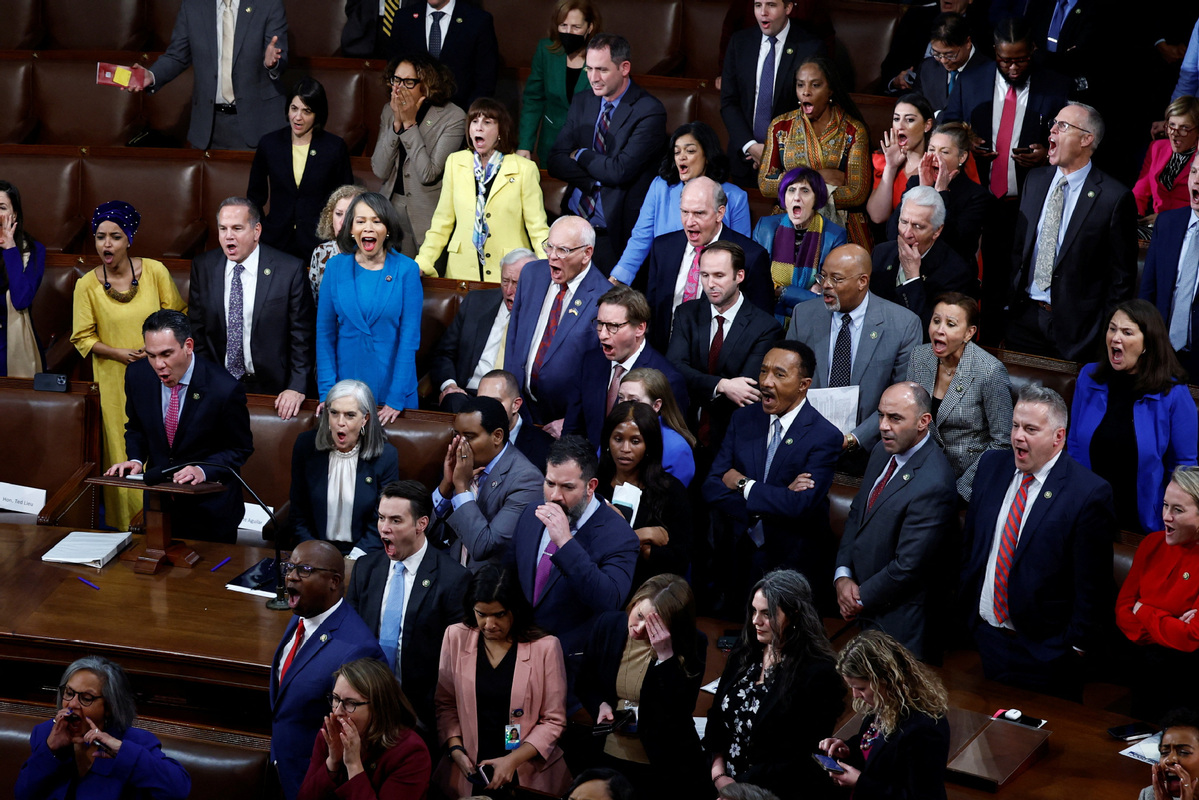House fails to elect speaker after three days
By AI HEPING in New York | chinadaily.com.cn | Updated: 2023-01-06 12:45

The US House of Representatives on Thursday failed to elect a speaker after 11 ballots in three days, leaving California Republican Kevin McCarthy unable to appease conservative holdouts by making more concessions for the gavel.
The House voted to adjourn until noon Friday as McCarthy and some of his detractors appeared to be coalescing around a deal.
The deadlock to elect a speaker surpassed the mark set in 1923, when it took nine ballots over three days, the last time a speaker wasn't elected on the first ballot. The 11 votes marked the most since 1860, when a leader was selected after 44 ballots. The record was set in 1856, when it took 133 rounds.
While most Republicans continued to back McCarthy, 20 continued to oppose him. His GOP opponents nominated two other Republicans — Representative Kevin Hern of Oklahoma, and former president Donald Trump — to draw votes from McCarthy. Trump received one vote.
Florida Representative Matt Gaetz nominated Trump. He voted for Trump on two earlier ballots, but it was the first time the ex-president had been nominated formally.
"I nominate President Trump because we must make our country great again, and he can start by making the House of Representatives great again," Gaetz said.
The 57-year-old McCarthy had 200 votes on Thursday. He needs 218 to win the speakership.
Democratic Leader Hakeem Jeffries had the unanimous support — 212 votes — of his caucus.
McCarthy's determination for the speakership has prompted him to agree to conditions that he has ruled out in the past.
He proposed more key concessions to get votes, including agreeing to propose a change that would allow just one member to call for a vote to push out a sitting speaker, according to The New York Times, The Wall Street Journal and CNN.
That was down from the threshold of five that McCarthy had previously agreed to, according to two people familiar with the matter, the Journal reported.
There also was an agreement to place more members of the House Freedom Caucus, which has many McCarthy detractors among its ranks, on powerful committees, according to the two people, the Journal said. The offer also included a promise to bring up for a vote a controversial border plan and a term-limit requirement, the people said.
The question was how many concessions he will have to make to win the support of the holdouts without weakening the speakership if he gets it or making the House ungovernable.
McCarthy and his allies huddled with defectors on Thursday evening in a room in the Capitol to try to finalize a deal.
CNN reported that GOP Representative Ralph Norman, one of the holdouts against McCarthy, said a deal that is in the works includes certain changes the conservatives fighting McCarthy want. Norman said most of the deal revolves around rule changes like a 72-hour rule to review bills, term limits and open amendments.
During the nominating of candidates for speaker, Colorado Republican Lauren Boebert continued her attack on McCarthy when she again nominated Oklahoma's Kevin Hern as speaker.
She said: "You see that Kevin McCarthy does not have the votes. You are understanding that he is not going to get there," and that "we need to get to a point where we start evaluating what life after Kevin McCarthy looks like."
The Republicans have such a slim majority that it has essentially empowered a small bloc of members to upend the chamber. And that drew a warning from former House speaker Newt Gingrich, who said that the anti-McCarthy Republicans were "playing with fire".
"This is the greatest danger we've had as a party since 1964," Gingrich said in an interview, referring to the Republican National Convention that saw moderates facing off against conservative insurgents.
The Republican base, he said, is "watching chaos in the House and they're watching the potential for a never-Trump and an always-Trump collision that could be devastatingly divisive".
Gingrich, a longtime Trump ally, warned that the leadership fight could have lasting ramifications, leading the base to wonder why they donated money to Senate and House candidates "to get this mess".
"I think the guys in the House are doing substantial damage to the Republican Party and don't even realize it," he said.
Former New Jersey governor Chris Christie, a potential 2024 Republican presidential contender, said: "This is what happens when you're a party out of power that doesn't have a clear national leader."
Republican New Hampshire Governor Chris Sununu said in a statement: "Should we really be surprised that a bunch of morons in Congress are holding things up? Of course not."
Agencies contributed to this story.
- House speaker fiasco symptomatic of toxic political extremism in US: China Daily editorial
- US House still in turmoil with no speaker elected on 2nd day of voting
- US House again fails to elect a speaker
- Limits to Growth author: China a leader in climate change response
- US House adjourns without new speaker after three votes
























